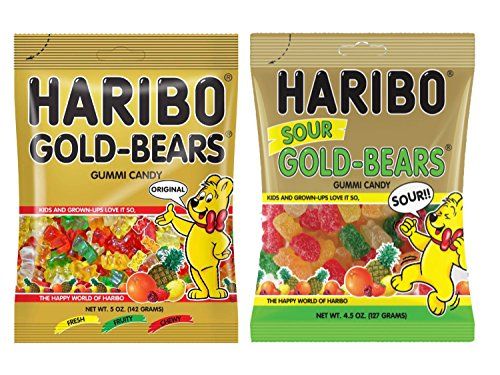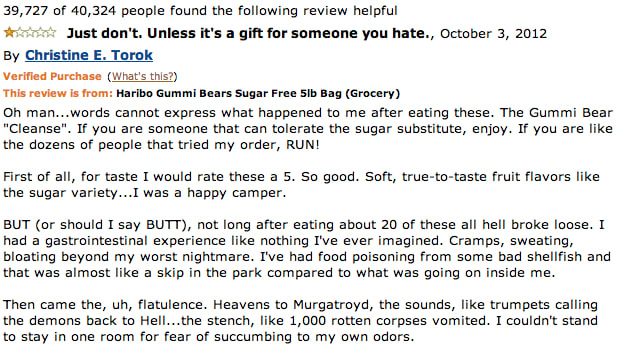Haribo Gummy Bears are an iconic treat, cherished for their chewy texture and fruity flavors. However, their sugar-free variant has gained notoriety, especially on platforms like Amazon, where users share their outrageous experiences. In this detailed report, we delve into the multifaceted perspective surrounding Haribo Sugar-Free Gummy Bears, exploring consumer reactions, health implications, and culinary preferences. By analyzing reviews and expert insights, we aim to understand why these little bears evoke such intense responses.

amazon reviews for sugar free haribo gummy bears
The Sweet Allure of Sugar-Free Treats
With growing health consciousness, many consumers are gravitating towards sugar-free alternatives. Sugar-free products provide a tempting option for those looking to cut down on calorie intake while satisfying their sweet tooth. However, Haribo’s venture into the sugar-free market has not gone without its controversies. Experts warn that artificial sweeteners, like Maltitol present in these gummy bears, can lead to gastrointestinal distress when consumed in excess.
amazon reviews for sugar free haribo gummy bears
According to Dr. John McDougall, a pioneer in plant-based medicine, “The explosion of sugar-free foods has given rise to many unhealthy dietary practices. Consumers need to be cautious about the sweeteners in these products.”
Consumer Reactions: Love and Laughter Amidst the Chaos
Amazon reviews for Haribo Sugar-Free Gummy Bears reveal a surprising blend of enthusiasm and horror. One review explicitly states, “See you in hell, Haribo Sugar-Free Gummy Bears,” capturing a common sentiment among consumers who have overindulged, leading to uncomfortable digestive consequences. Others, however, celebrate the taste, rating it highly but cautioning, “Just don’t eat more than a handful!” This dichotomy of experiences resonates with many, reflecting the broader experience of the health-conscious consumer caught between indulgence and moderation.
The Science Behind the Sweets
So, what happens when one indulges in these sugary impostors? The primary sweetener, Maltitol, belongs to a category known as polyols, which can cause upset stomach, gas, and diarrhea when consumed in significant quantities. Research from the National Institutes of Health highlights that while polyols can be advantageous for dental health and may have a lower glycemic index than sugar, they can disrupt digestive health. Nutritionist Sarah Greenfield notes, “While sugar-free options can be beneficial in moderation, there’s definitely a tipping point where they can do more harm than good.”
Impact on Health: A Balanced Perspective
It’s crucial to approach sugar-free products with a balanced mindset. While they can aid those managing diabetes or seeking weight loss, excessive consumption can lead to adverse effects. The balance lies in understanding one’s own body and how it reacts to different sweeteners. Lifestyle expert, Dr. Emily Buehler, emphasizes this point, stating, “Self-love and a healthy relationship with food are essential. Moderation is key.”
The Cultural Phenomenon of Reviews
Haribo Sugar-Free Gummy Bears have not just been a topic of culinary discussion but also a source of internet humor. The vibrant array of reviews has inspired memes, videos, and articles that dissect these experiences. Platforms such as Reddit flourish with threads like “The Horror That Is Haribo Sugar-Free Gummy Bears,” where users recount their tales of woe blended with laughter. This phenomenon encapsulates the human experience: finding joy in shared mishaps.
Influencer Insights: Government vs. Free Will
In a digital age where influencers guide consumer choices, figures like food blogger Amanda Chantal Bacon have highlighted the importance of transparency in food labeling. “Knowing what goes into our bodies shouldn’t be a luxury,” she asserts. The accountability of companies like Haribo in clarifying ingredients is paramount for maintaining trust and ensuring consumer well-being. Not only does this transparency alleviate fears but it elevates the brand as one that prioritizes health and education.
Beyond Health: The Emotional Connection
The discussion surrounding Haribo’s sugar-free gummy bears transcends taste and health implications; it evokes emotions of nostalgia, humor, and even horror. For many, gummy bears represent childhood and carefree indulgence. In the realm of today’s health-oriented society, they become symbols of the struggle between indulgence and discipline. This emotional tug-of-war enhances our relationship with food and highlights the necessity for mindfulness in our choices.
In Conclusion: A Journey Towards Balance and Wisdom
As we navigate the world of Haribo Sugar-Free Gummy Bears, it becomes clear that these candies are more than just a fun treat. They embody contemporary dilemmas relating to health, the comedic side of consumer reviews, and the power of community in sharing experiences. The key takeaway? Enjoy these gummy bears, but proceed with caution and in moderation. Likewise, foster a healthy relationship with food that embraces love, balance, and self-awareness.
Frequently Asked Questions (FAQ)
Why did HARIBO discontinue sugar-free gummy bears?
Haribo faced backlash due to widespread reports of severe digestive issues resulting from the excessive consumption of their sugar-free gummy bears. This led to the discontinuation of the product in some markets to address consumer health concerns.
What is the sweetener in HARIBO sugar-free gummy bears?
The main sweetener used in HARIBO sugar-free gummy bears is Maltitol, a sugar alcohol that can cause gastrointestinal discomfort when consumed in large quantities.
Is there sugar-free HARIBO available?
Yes, HARIBO does offer sugar-free gummy options, though consumers are advised to read labels carefully and consume them in moderation.
How much sugar is in HARIBO gummy bears?
Regular HARIBO gummy bears contain a small amount of sugar, typically around 14 grams of sugar per serving, depending on the exact product variant.